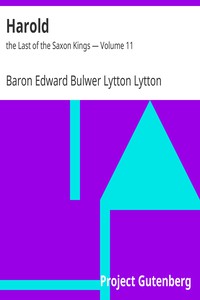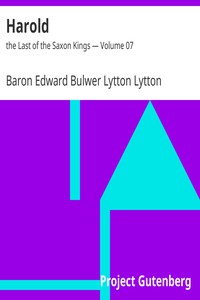Harold : the Last of the Saxon Kings — Complete by Lytton (good books for 8th graders .TXT) 📗

- Author: Lytton
Book online «Harold : the Last of the Saxon Kings — Complete by Lytton (good books for 8th graders .TXT) 📗». Author Lytton
Small and slight as was his stature, worn and ragged his mantle of state, there was that in the erect mien and steady eye of the Cymrian hero, which showed one conscious of authority, and potent in will; and the wave of his hand to the knight was the gesture of a prince on his throne. Nor, indeed, was that brave and ill-fated chief without some irregular gleams of mental cultivation, which under happier auspices, might have centred into steadfast light. Though the learning which had once existed in Wales (the last legacy of Rome) had long since expired in broil and blood, and youths no longer flocked to the colleges of Caerleon, and priests no longer adorned the casuistical theology of the age, Gryffyth himself, the son of a wise and famous father 172, had received an education beyond the average of Saxon kings. But, intensely national, his mind had turned from all other literature, to the legends, and songs, and chronicles of his land; and if he is the best scholar who best understands his own tongue and its treasures, Gryffyth was the most erudite prince of his age.
His natural talents, for war especially, were considerable; and judged fairly—not as mated with an empty treasury, without other army than the capricious will of his subjects afforded, and amidst his bitterest foes in the jealous chiefs of his own country, against the disciplined force and comparative civilisation of the Saxon—but as compared with all the other princes of Wales, in warfare, to which he was habituated, and in which chances were even, the fallen son of Llewellyn had been the most renowned leader that Cymry had known since the death of the great Roderic.
So there he stood; his attendants ghastly with famine, drawn up on the unequal ground; above, on the heights, and rising from the stone crags, long lines of spears artfully placed; and, watching him with deathful eyes, somewhat in his rear, the Traitor Three.
“Speak, father, or chief,” said the Welch King in his native tongue; “what would Harold the Earl of Gryffyth the King?”
Then the monk took up the word and spoke.
“Health to Gryffyth-ap-Llewellyn, his chiefs and his people! Thus saith Harold, King Edward’s thegn: By land all the passes are watched; by sea all the waves are our own. Our swords rest in our sheaths; but famine marches each hour to gride and to slay. Instead of sure death from the hunger, take sure life from the foe. Free pardon to all, chiefs and people, and safe return to their homes,—save Gryffyth alone. Let him come forth, not as victim and outlaw, not with bent form and clasped hands, but as chief meeting chief, with his household of state. Harold will meet him, in honour, at the gates of the fort. Let Gryffyth submit to King Edward, and ride with Harold to the Court of the Basileus. Harold promises him life, and will plead for his pardon. And though the peace of this realm, and the fortune of war, forbid Harold to say, ‘Thou shalt yet be a king;’ yet thy crown, son of Llewellyn, shall at least be assured in the line of thy fathers, and the race of Cadwallader shall still reign in Cymry.”
The monk paused, and hope and joy were in the faces of the famished chiefs; while two of the Traitor Three suddenly left their post, and sped to tell the message to the spearmen and multitudes above. Modred, the third conspirator, laid his hand on his hilt, and stole near to see the face of the King;—the face of the King was dark and angry, as a midnight of storm.
Then, raising the cross on high, Evan resumed.
“And I, though of the people of Gwentland, which the arms of Gryffyth have wasted, and whose prince fell beneath Gryffyth’s sword on the hearth of his hall—I, as God’s servant, the brother of all I behold, and, as son of the soil, mourning over the slaughter of its latest defenders—I, by this symbol of love and command, which I raise to the heaven, adjure thee, O King, to give ear to the mission of peace,—to cast down the grim pride of earth. And instead of the crown of a day, fix thy hopes on the crown everlasting. For much shall be pardoned to thee in thine hour of pomp and of conquest, if now thou savest from doom and from death the last lives over which thou art lord.”
It was during this solemn appeal that the knight, marking the sign announced to him, and drawing close to Gryffyth, pressed the ring into the King’s hand, and whispered:
“Obey by this pledge. Thou knowest Harold is true, and thy head is sold by thine own people.”
The King cast a haggard eye at the speaker, and then at the ring, over which his hand closed with a convulsive spasm. And at that dread instant the man prevailed over the King; and far away from people and monk, from adjuration and duty, fled his heart on the wings of the storm—fled to the cold wife he distrusted: and the pledge that should assure him of life, seemed as a love-token insulting his fall:—Amidst all the roar of roused passions, loudest of all was the hiss of the jealous fiend.
As the monk ceased, the thrill of the audience was perceptible, and a deep silence was followed by a general murmur, as if to constrain the King.
Then the pride of the despot chief rose up to second the wrath of the suspecting man. The red spot flushed the dark cheek, and he tossed the neglected hair from his brow.
He made one stride towards the monk, and said, in a voice loud, and deep, and slow, rolling far up the hill:
“Monk, thou hast said; and now hear the reply of the son of Llewellyn, the true heir of Roderic the Great, who from the heights of Eryri saw all the lands of the Cymrian sleeping under the dragon of Uther. King was I born, and king will I die. I will not ride by the side of the Saxon to the feet of Edward, the son of the spoiler. I will not, to purchase base life, surrender the claim, vain before men and the hour, but solemn before God and posterity—the claim of my line and my people. All Britain is ours—all the island of Pines. And the children of Hengist are traitors and rebels—not the heirs of Ambrosius and Uther. Say to Harold the Saxon, Ye have left us but the tomb of the Druid and the hills of the eagle; but freedom and royalty are ours, in life and in death—not for you to demand them, not for us to betray. Nor fear ye, O my chiefs, few, but unmatched in glory and truth; fear not ye to perish by the hunger thus denounced as our doom, on these heights that command the fruits of our own fields! No, die we may, but not mute and revengeless. Go back, whispering warrior; go back, false son of Cymry—and tell Harold to





Comments (0)